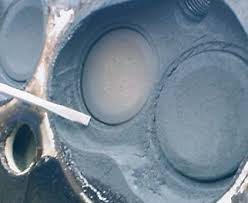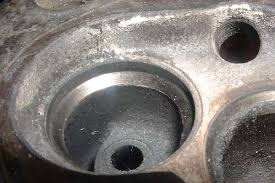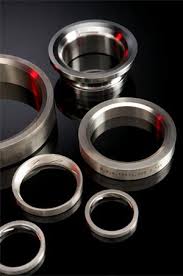-
Posts
38,189 -
Joined
-
Last visited
Content Type
Profiles
Forums
Events
Gallery
Everything posted by Ace-Garageguy
-
While the intended purpose of adding lead was not to lubricate valve seats, it was a beneficial side-effect. When lead was first removed from motor fuels, some engines that were built with non-hardened valve seats experienced severe erosion of the seats, with the valves literally machining themselves into recesses. Depending on the head material, several means of seat hardening can be used to prevent this, from local induction hardening of the seat areas in cast iron, to machining and installation of hard seat inserts in ferrous as well as non-ferrous heads. Non-ferrous heads, of course, have always required seat inserts made from a harder material. Lead additives, as you mention, can also be beneficial for protecting older engines from valve seat erosion. This is a good illustration of valve seat erosion, or "recession", where the exhaust valve has worn itself into a recess in the seat: Here are some vale-seat inserts for various applications. The head is machined slightly undersized, and the inserts are "shrunk" in by being chilled, with the head warmed. They are final-machined after the temperature stabilizes. As far as the "vapor-pressure" question goes, this was the reason fuel manufacturers themselves began changing fuel blends seasonally, prior to any government intervention.
-

Custom Cadillac
Ace-Garageguy replied to Richard Bartrop's topic in General Automotive Talk (Trucks and Cars)
I have one on the shelf for that very reason...and though I haven't measured it, it seems to be just a tad underscale...but don't hold me to that. -
You're exactly correct as far as you go, but "gasoline" is actually a blend of several "-anes"...like octane, alkane, heptane, isobutane etc., as well as some "-enes". "Aviation" fuel is simply a very high percentage of octane. A small percentage of tetraethyl lead USED to be added to lower-grade fuels to mimic the higher-octane-content of more expensive grades, but this has been eliminated for the most part. These products of the distillation of crude stocks are blended to get specific combustion characteristics in engines, including anti-knocking, easy starting in cold weather, and resistance to vapor lock in hot weather. https://newsroom.aaa.com/2013/06/what-is-the-difference-between-summer-and-winter-blend-gasoline/ Also see: https://auto.howstuffworks.com/fuel-efficiency/fuel-consumption/summer-fuel.htm And ONE reason motor fuel is more expensive than it used to be is because lead can no longer be used to boost octane ratings, so a smaller percentage of a barrel of crude is available to produce high-grade fuel. Different grades of crude will also yield their fractionated components in varying proportions. "Light sweet crude" with a low sulfur content is the most in-demand of the crude oils, as it contains a disproportionately large fraction that is directly processed into motor fuels.
-

'52 Ford Mainline Business Coupe/NYPD RMP
Ace-Garageguy replied to SfanGoch's topic in WIP: Model Cars
Looking good. I've been wanting to do one of these too. Thanks for showing how to go about it. -

Wild 2021 Dodge Viper
Ace-Garageguy replied to Greg Myers's topic in General Automotive Talk (Trucks and Cars)
Agreed. The prototype was the best one by far. BUT: 1) Bring back the side pipes 2) Clean up the unnecessarily busy nose and stretch the wheelbase a tick 3) Make a more pronounced double-bubble roof. -

Custom Cadillac
Ace-Garageguy replied to Richard Bartrop's topic in General Automotive Talk (Trucks and Cars)
Man, those things look good on the deck, with a chop. Oz Welch built something similar a while back... -

Lancia Stratos Zero in motion
Ace-Garageguy replied to Richard Bartrop's topic in General Automotive Talk (Trucks and Cars)
Another great vid. Wonderfully over-the-top styling exercise. Wouldn't it be cool if that was the real world? Glad to see she's well taken care of, and capable of self-motivation. -

Engine turning
Ace-Garageguy replied to landman's topic in General Automotive Talk (Trucks and Cars)
I've seen a fair number of engine-turned parts in my time. We (a shop I worked for) once had a Hispano Suiza that had been owned by Valentino, with an entirely engine-turned aluminum body. The usual diameter of the swirls I've seen could be anywhere from about 3/8" to 3/4" inch, with adjacent ones overlapping a bit. -
I remember the seasonal price spikes being blamed on "changing blends" mumbo-jumbo from at least 50 years back, with my old man carping about the same thing. Remarkably, prices always seemed to go up just prior to a lotsa-driving holiday. The seasonal blending then had to do with tinkering with evaporation temperatures so engines would start easier in cold weather, and so fuel would be more resistant to vapor-lock in hot weather. Cold starting with high percentages of alcohol can also be an issue.
-
Great vid, but those carbs sound a little off. I always loved this thing. Beautiful, beautiful little car. A company I worked for long ago raced an Abarth 1300 OT in SCCA C-Sports Racing. The engine was very similar to this, designed by the same hand. Based on Simca and Fiat 850 chassis parts, the 1300 OT was rear-engined also, and sounded much the same. Power peak was around 8800 RPM, if I remember correctly. The car had a history of DNFs and less-than-stellar performance with its previous US owner, Al Cosentino (a remarkably successful driver in several Fiat/Abarth cars). After I went through the engine shortly after we purchased it, it finished every race for us, never placing lower than 3rd. Ours was the first series, pre-"periscope". I occasionally tested the car on the downtown Atlanta city streets in the middle of the night.
-
Must be why a lot of folks are calling it Soylo.
-

Air compressor from a fridge compressor
Ace-Garageguy replied to Bainford's topic in Model Building Questions and Answers
Even the large compressors we use in real-car body and paint shops are lubricated internally, and introduce a small amount of oil into the compressed air. A GOOD oil separator / filter is essential, along with a water trap, located far enough from the compressor so that the air cools and contaminants tend to condense out of the air prior to going through the filters. -

MCM Problems?
Ace-Garageguy replied to 426 pack's topic in General Automotive Talk (Trucks and Cars)
Bring on the self-driving cars. -
And remember kids, computers and software are always 100% reliable. Bring on the self-driving cars.
-

Figuring out a scale size...Help!
Ace-Garageguy replied to MAGIC MUFFLER's topic in Model Building Questions and Answers
That's a good rule-of-thumb to put on a sticky note in plain view over the bench. -

Engine turning
Ace-Garageguy replied to landman's topic in General Automotive Talk (Trucks and Cars)
Very nice. Sounds very promising. Very nice indeed. Being able to raise and lower the rotating brush precisely, and accurately advance and position the work on the mill table makes such evenly spaced results more consistently achievable. I'll have to give that a shot on my old Unimat. -
Yes, the OP mentioned two seats.
-

MCM Problems?
Ace-Garageguy replied to 426 pack's topic in General Automotive Talk (Trucks and Cars)
Yup. -

Small Block Chevy starter location question
Ace-Garageguy replied to OldNYJim's topic in Model Building Questions and Answers
I see the alternator, forward of the intake manifold and above the water pump in your photo, but not the starter. The standard starter location for a SBC is down low on the passenger side of the engine. It appears there is sufficient space for the starter there on your photo. -
I've used multiple products from both of these companies. Never a problem, everything first rate. https://www.freemansupply.com/ https://www.polytek.com/
-

Engine turning
Ace-Garageguy replied to landman's topic in General Automotive Talk (Trucks and Cars)
I know at least one builder who's done very respectable engine-turning in 1/24-1/25 by hand, using a sharpened eraser. Very tedious, but possible. -

Anyone buying Revell kits just in case?
Ace-Garageguy replied to slusher's topic in General Automotive Talk (Trucks and Cars)
Never a shortage of greedtards. There are two more listed for a somewhat more reasonable $100 or so. Funny, many of the other Foose kits are up for less than 20 bucks. -
Good looking model. Actually, there were a few more requirements. The cars, sanctioned under "FIA Group 7", were supposed to be "sports cars" and as such, also had to have opening doors, self-starters, lights, and originally, a spare wheel/tire (the front lights and spare tire rules were dropped), and run on pump-gas. There was also a minimum weight of somewhere around 1500 pounds, and safety regs required a roll bar and split braking system. Everything else was, as you say, unlimited, and that's why we saw such wild things as the "sucker" Chaparral. Truly the golden age of motorsports.
-

The most dangerous race
Ace-Garageguy replied to 935k3's topic in General Automotive Talk (Trucks and Cars)
The closer I get to dying of old age, the less interest I have in spending any of my remaining time in traction in the hospital. I won't even ride my little 600 Cow in traffic anymore. I don't know if I've become more of a coward or just smarter. -

Testor’s clear window glue
Ace-Garageguy replied to ewetwo's topic in Model Building Questions and Answers
ALL the white "canopy" glues are chemically the same as "Elmer's" white glue...PVA, which is polyvinyl-acetate. They ALL should be white, of uniform viscosity with no clumps, and they ALL dry clear. They are ALL water-soluble before they dry, and what YOU have is some that's settled and almost dried out, probably from sitting on the shelf for years. The "clear" stuff you see is mostly water that's separated. You SHOULD be able to stir it and shake it back into an even consistency, possibly needing to add a few drops of water. My particular go-to is this:




